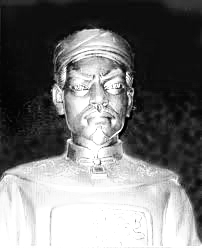| Nguyễn Hoàng 阮潢 | |||||||||||||||||
|---|---|---|---|---|---|---|---|---|---|---|---|---|---|---|---|---|---|
| Nguyễn lords Lord of Đàng Trong | |||||||||||||||||
 | |||||||||||||||||
| Nguyễn Lords | |||||||||||||||||
| Reign | 14 February 1558 – 20 July 1613 | ||||||||||||||||
| Predecessor | Military Commander established | ||||||||||||||||
| Successor | Nguyễn Phúc Nguyên | ||||||||||||||||
| Born | (1525-08-28)28 August 1525 Thanh Hóa Province | ||||||||||||||||
| Died | 20 July 1613(1613-07-20) (aged 87) Đàng Trong | ||||||||||||||||
| Spouse | Nguyễn Thị | ||||||||||||||||
| Issue | Nguyễn Phúc Nguyên | ||||||||||||||||
| |||||||||||||||||
| House | Nguyễn | ||||||||||||||||
| Father | Nguyễn Kim | ||||||||||||||||
| Mother | Nguyễn Thị Mai | ||||||||||||||||
| Religion | Buddhism | ||||||||||||||||
Nguyễn Hoàng (28 August 1525 – 20 July 1613) was a Vietnamese official who ruled southern Vietnam from 1558 to his death in 1613. As the first of the Nguyễn lords, he established a powerful state that contested rule over Vietnam for the next two centuries. He was the ancestor of Nguyễn Ánh, who would later become emperor of a united Vietnam.
Early life
He was the second son of Nguyễn Kim. When his father was assassinated by a Mạc supporter, his brother-in-law Trịnh Kiểm took command of the Lê royalist army. Sometime after his older brother (Nguyễn Uông) died (believed to have been poisoned), Nguyễn Hoàng requested his brother in law, and was appointed to govern the southernmost province of Vietnam. This land was formerly Champa territory which had been conquered by emperor Lê Thánh Tông and at the time was under control of Mạc force. Nguyễn Hoàng defeated the enemy commander Duke Lập and took over the province in 1558. In 1573 he was given the title Grand Master (Thái phó) by Emperor Lê Thế Tông. Later he was given the title Duke of Môn (Môn Công).
Rule
In 1592, when Trịnh Tùng laid siege to the Eastern Capital (modern-day Hanoi), Nguyễn Hoàng lend him resources and troops. The Nguyen army joined the Royal (Trịnh) army and helped destroy the remainder of the Mạc army. For reasons that are mysterious, when the new Emperor, Lê Kinh Tông, ascended the throne, Nguyễn Hoàng refused to recognize the new sovereign and instead took for himself the new title of Good Prince (Huu Vuong) in 1600. Perhaps an explanation is found in that his nephew Trịnh Tùng had been given a similar title just one year earlier: Pacifying Prince (Bình An Vương). Nguyễn Hoàng had many children (10 sons) but most of them either lost their lives in the battlefields or stayed in the North. His 6th son Nguyễn Phúc Nguyên succeeded him upon his death in 1613. He ruled the south for 55 years.
The reason Trịnh Kiểm appointed Nguyễn Hoàng to the Southern provinces is not clear. As anecdote goes, Trinh Kiểm, being afraid of losing power to Nguyễn brothers, ordered the assassination of Nguyễn Hoàng's older brother. As for Hoang, Trịnh Kiểm wanted to take advantage of Mạc's southern garrison troops to eliminate his brother in law.
During his time in the south, Nguyễn Hoàng held court in multiple capitals: Ái Tử (1558–70), Trà Bát (1570–1600), and Dinh Cát (modern-day Huế, 1600–13).
Legacy
Nguyễn Hoàng is still fondly remembered in central and southern Vietnam, especially in Huế where he and his descendants established their final capital. In 2013, his 400th death anniversary was celebrated in Huế.
See also
References
- "Six Senses Ninh van Bay". 2 May 2012.
Sources
- Encyclopedia of Asian History, Volume 3 (Nguyen Lords) 1988. Charles Scribner's Sons, New York.
- Annam and its Minor Currency Chapter 16 (downloaded May 2006)
| Vietnamese royalty | ||
|---|---|---|
| Preceded byNguyễn Kim | Nguyễn lords | Succeeded byNguyễn Phúc Nguyên |
| title established | Lord of Đàng Trong 1558–1613 |
Succeeded byNguyễn Phúc Nguyên |
| Nguyễn lords | |
|---|---|